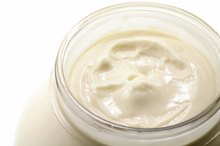The Effects of Microwaving on Food
Microwaves have some significant effects on foods -- they can denature proteins, decrease vitamin content and destroy enzymes. However, none of these effects are unique to microwave ovens. Conventional cooking has identical effects, notes Dr. D. Zhang and colleagues in a 2004 study in "Food Chemistry," as these are all effects of heating, rather than effects unique to microwave radiation 2.
Microwaves
A microwave oven cooks food by causing the molecules that make up the food -- specifically water molecules -- to vibrate rapidly. As they vibrate, these molecules rub against each other, which generates heat through friction. If you rub your hands together rapidly, you'll feel your palms get warm -- this is similar to the way in which a microwave generates heat through friction. Given enough vibration, the food generates enough heat to cook it.
- A microwave oven cooks food by causing the molecules that make up the food -- specifically water molecules -- to vibrate rapidly.
- If you rub your hands together rapidly, you'll feel your palms get warm -- this is similar to the way in which a microwave generates heat through friction.
Microwave Misconceptions
Do Microwave Ovens Kill Food Enzymes?
Learn More
You may have heard that the radiation a microwave depends on damages your food or has a negative effect upon it. This is not true. Despite the fact that the words sound similar, "radiation" and "radioactive" are not the same thing. Microwave radiation is much more similar to heat wave radiation than it is to nuclear radiation; it can't "kill" your food or make it dangerous or radioactive. In fact, the only effects that a microwave can have on food are those that stem from heating -- just as conventional cooking can affect food through heating it.
- You may have heard that the radiation a microwave depends on damages your food or has a negative effect upon it.
- Microwave radiation is much more similar to heat wave radiation than it is to nuclear radiation; it can't "kill" your food or make it dangerous or radioactive.
Effects of Heating
When you heat food, you affect the proteins in it. Heat makes proteins change shape, which is called "denaturing" the proteins. While this causes them to lose function, it doesn't affect the nutrient value. In fact, you don't use any of the proteins in your food for their function. When you consume protein, your stomach acid denatures the protein -- just as heat does -- and you break the protein down into its constituent parts, explain Drs. Mary Campbell and Shawn Farrell in their book "Biochemistry." Enzymes are proteins, and you don't use the enzymes in your food 1. As such, though microwaving, like conventional cooking, destroys enzymes, this is of no concern, because the enzymes your body depends on are produced by the cells of the digestive tract.
- When you heat food, you affect the proteins in it.
- While this causes them to lose function, it doesn't affect the nutrient value.
Vitamins
What Are the Dangers of Heating Mayonnaise?
Learn More
Another effect of microwaving on food is that it slightly reduces the vitamin content. Again, however, this is an effect of heat, and is true in the case of conventional cooking as well. Dr. D. Zhang and colleagues note that any cooking method decreases vitamin content, with more destruction occurring the longer food is cooked. Since microwaves cook food more quickly, they actually result in less destruction of vitamins than conventional cooking methods.
- Another effect of microwaving on food is that it slightly reduces the vitamin content.
- Dr. D. Zhang and colleagues note that any cooking method decreases vitamin content, with more destruction occurring the longer food is cooked.
Related Articles
References
- “Biochemistry”; Mary Campbell, Ph.D., and Shawn Farrell, Ph.D.; 2005
- "Food Chemistry"; Phenolics, ascorbic acid, carotenoids and antioxidant activity of broccoli and their changes during conventional and microwave cooking; D. Zhang et al.; December 2004
- Siebens J. U.S. Census Bureau. Extended Measures of Well-Being: Living Conditions in the United States: 2011. Updated September 2013.
- Harvard Health Publishing. Microwave cooking and nutrition. Updated February 6, 2019.
- World Health Organization. Electromagnetic fields & public health: Microwave ovens. Updated February 2005.
- Lund D. Effects of Heat Processing on Nutrients. In: Karmas E, Harris RS, eds. Nutritional Evaluation of Food Processing. Dordrecht: Springer; 1988. doi:10.1007/978-94-011-7030-7_12
- American Cancer Society. Radiofrequency (RF) Radiation. Updated June 1, 2020.
- Yang CZ, Yaniger SI, Jordan VC, Klein DJ, Bittner GD. Most Plastic Products Release Estrogenic Chemicals: A Potential Health Problem That Can Be Solved. Environ Health Perspect. 2011;119(7):989‐996. doi:10.1289/ehp.1003220
Writer Bio
Kirstin Hendrickson is a writer, teacher, coach, athlete and author of the textbook "Chemistry In The World." She's been teaching and writing about health, wellness and nutrition for more than 10 years. She has a Bachelor of Science in zoology, a Bachelor of Science in psychology, a Master of Science in chemistry and a doctoral degree in bioorganic chemistry.









